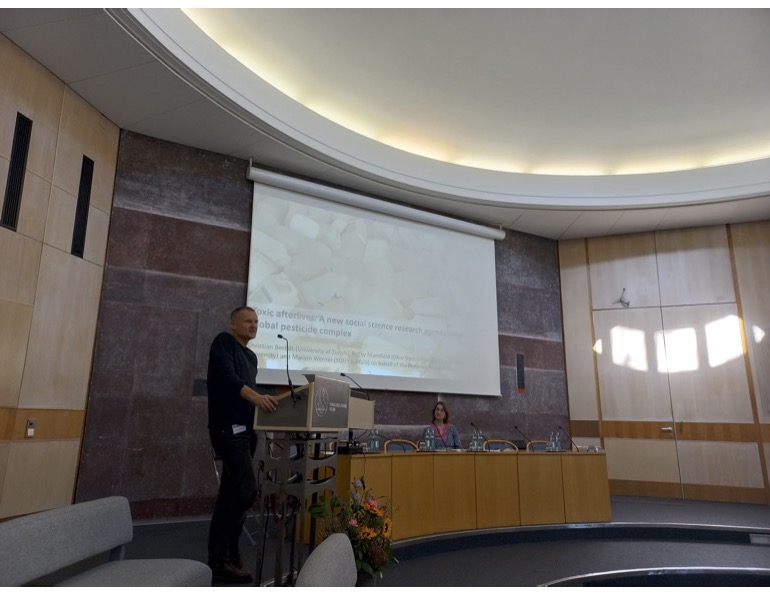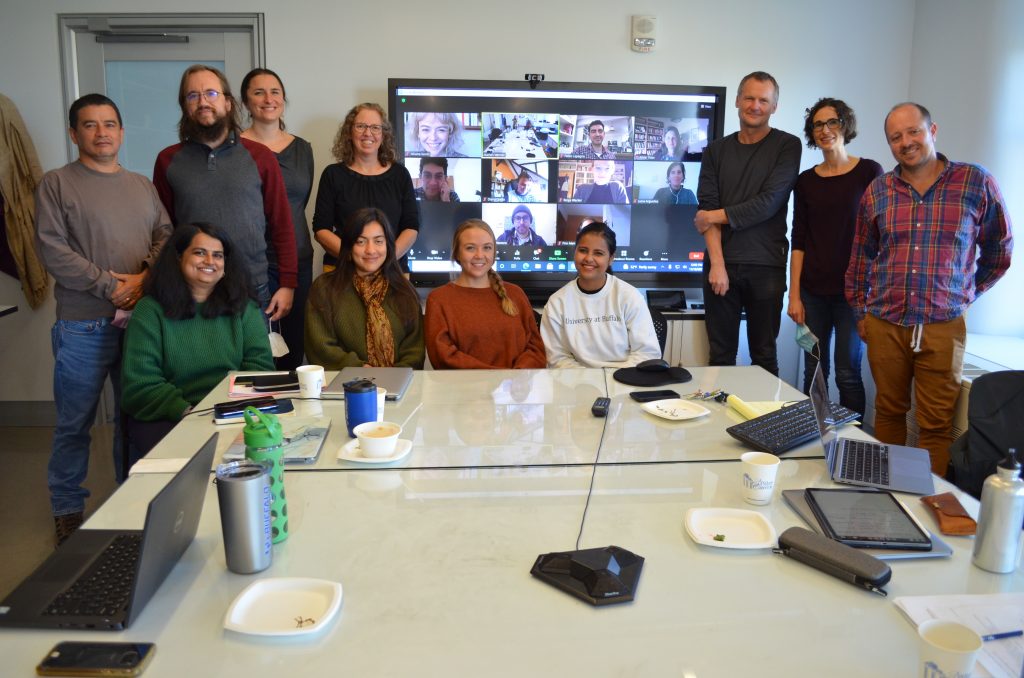PRN hosted a third workshop on May 15th, featuring a co-authored paper by Dr. Sarah Rogers (University of Melbourne) and PhD candidate Zhao Yue (University of Melbourne). The scholars shared their paper, Tracing China’s agrochemical complex, to a group of 22 scholars based in five countries. Anne Tittor (University of Jena) and Christian Berndt (University of Zurich) offered insightful commentaries. Many thanks to the authors for sharing their early work, to discussants for their commentaries, and to participants for additional insights and questions. We look forward to our next workshop in September 2023.
All posts by csears3
Pesticide Research Network’s January workshop on Pesticides and Monocrops in Costa Rica
PRN hosted its third workshop on January 27th featuring a paper co-authored by ICTA-UAB PhD candidate Sole Castro and UB faculty member Marion Werner titled Pesticides and Food Regimes: A view from Costa Rica. The paper drew on Castro’s long-term fieldwork in Costa Rica to consider the legacies of decades of pesticide use — in soils, human bodies and social relations — for agrarian livelihoods. Fourteen scholars from five countries attended the workshop. Fernando Ramírez (IRET, Costa Rica) and Lucía Argüelles (Universitat Oberta de Catalunya) offered comments, followed by a lively discussion. We welcome participants to our next paper workshop in May 2023.
Pictured above, an ex-banana plantation worker shows the drainage and irrigation infrastructure used by the United Fruit Company over the course of the last century in the Pacific region of Costa Rica. UFCo divested from banana production on this plantation in the 1980s but this infrastructure, synthetic twine and copper sulfate pesticide persist in the soil and continue to condition livelihoods for the parceleros (farmers of small plots or parcelas) who now work this land. Photograph by Soledad Castro.
New Social Science Research Agenda for Pesticides Presented at “Silent Springs” Conference

On October 8th, Christian Berndt (University of Zurich) presented “Toxic afterlives: A new social science research agenda on the global pesticide complex” at the interdisciplinary “Silent Springs” workshop in Tutzing, Germany. The workshop was organized by the Rachel Carson Center for Environment and Society, a joint initiative of LMU-München and Deutsches Museum. The research agenda emerged from the inaugural “Global Glyphosate” workshop and written jointly by Becky Mansfield (Ohio State University), Annie Shattuck (Indiana University), Marion Werner (SUNY Buffalo), and Christian, with contributions from numerous workshop participants. The agenda will contribute to furthering the establishment of, and collaborations among, the Pesticide Research Network, which emerged from the workshop. Christian received excellent feedback from workshop participants, many of them environmental historians. Christian was joined by Soledad Castro (ICTA-UAB), who presented her co-authored paper on the chemicalization of agriculture in Costa Rica.
Second Successful Pesticide Research Network (PRN) Workshop
PRN hosted a second workshop on September 19th, this time featuring papers co-authored by faculty and PhD students. Twenty-one scholars based in six countries met virtually to discuss two papers. Andrés Caicedo (Environmental Studies UC-Berkeley) and Diana Ojeda (CIDER, Universidad de los Andes) shared a paper titled Pesticides, Plantations and Anti-Subversive tactics: Agro-military violence in Colombia. Brian Williams (Mississippi State University) and Johana Kunin (Escuela IDAES, Universidad Nacional de San Martín, Argentina) offered commentaries. Aniket Aga (Ashoka University) and Chitrangada Choudhury shared a draft of their paper, Killing Agroecology: The coming of the cotton-glyphosate complex in an Indian highland frontier. The paper received comments from Annie Shattuck (Indiana-Bloomington) and Abhigya (Indian Institute of Technology). Many thanks to our authors for sharing their early works, to reviewers for their astute commentaries, and to participants for additional insights and vibrant conversation. We look forward to our next workshop in January 2023.
Successful first Early Careers Workshop held by Pesticide Research Network
The Pesticide Research Network recently held its first successful Early Careers Workshop, designed to give graduate students and faculty support and feedback on scholarly works-in-progress. Our first participants sharing their work were Abhigya, a visiting fellow at Harvard Kennedy School, and student at the Indian Institute of Technology, New Delhi and Lorena Arias Solano from the Interdisciplinary Center for Development Studies (CIDER) at Universidad de los Andes. Abhigya circulated a working chapter of her dissertation entitled Beyond crops and corporations: Shaping crop protection practices in ‘basmati’ rice cultivation in the Western plains of Uttar Pradesh and received feedback from Aniket Aga (Ashoka University) and Annie Shattuck (Indiana University). Lorena depicted her research through a short video and shared a working proposal entitled Waterscapes, sugar production and politics of death in Colombia. She received feedback from Becky Mansfield (Ohio State University) and Marion Werner (University at Buffalo, SUNY).
The research network plans for an upcoming fall workshop in September.
New research group, Pesticide Research Network (PRN), to hold first Early Career Scholars workshop
A newly formed group of scholars and activists from eight different countries will hold their first early careers workshop on May 11th, 2022 from 10am-12pm (EST). Graduate students preparing to submit their dissertations will share their works-in-progress for critique, feedback and guidance. This year’s participants are Abhigya, Lorena Arias Solano, and María Soledad Castro Vargas. The workshop will take place virtually and will consist of short sessions dedicated to each scholar’s work, followed by feedback from two faculty members, and open discussion for comments and feedback from participants. If you are interested in attending, or would like more information on the Pesticide Research Network, please contact Dr. Marion Werner, wernerm@buffalo.edu.
Global Glyphosate Workshop held at University at Buffalo, SUNY

Scholars from eight countries gathered over two days in-person and virtually in November 2021 at the University at Buffalo to discuss new social science research challenges in the study of glyphosate and pesticide more broadly. The workshop allowed scholars from various backgrounds to consider the political, economic, environmental and public health implications of the pervasive use of agrochemicals. Researchers spent the initial day in breakout groups covering topics including the agrochemical industry restructuring, social science lenses on toxicity, and emerging geographies of regulation. On the second day, a larger group gathered to share themes, major points of discussion and raise questions. Ultimately, participants in the workshop plan to move forward with a research agenda based on the knowledge gained and shared over the two-day gathering.
This interdisciplinary workshop was the starting point for the Pesticide Research Network (PRN), a group of researchers using a critical social science lens to identify and address challenges posed by pesticides. If you would like to join PRN, please contact Caitlyn Sears (csears3@buffalo.edu).
For more information on the workshop, its participants and participant papers, see the University at Buffalo’s website.